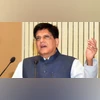Commerce and Industry Minister Piyush Goyal and his British counterpart Kemi Badenoch will make another attempt to iron out differences and decide the future course of action on the much-awaited free trade agreement (FTA) between the two countries before the general elections.
The ministers are expected to hold bilateral talks on the sidelines of the World Trade Organization’s four-day summit – the 13th Ministerial Conference -- in Abu Dhabi.
The meeting between Goyal and Badenoch will take place a week after a delegation headed by commerce secretary Sunil Barthwal was sent to London to seal the deal.
“The bilateral between Piyush Goyal and his UK counterpart at the sidelines of the WTO meet (MC13) holds the key for the future course of action,” a person aware of the matter told Business Standard.
This is an indication that the ball is now in the courts of respective political leaders to announce the signing of the FTA deal as most of the issues have been closed at the negotiators' level.
“Certain issues can only be resolved after a final political call is taken to sign the deal,” the person cited above said.
More From This Section
India and the UK have been negotiating a trade deal for over two years now. Both sides already missed the Diwali deadline in 2022, set by former UK Prime Minister Boris Johnson.
A year later, both sides were aiming to finalise the deal by October in the presence of Prime Minister Narendra Modi and his British counterpart Rishi Sunak in New Delhi. However, continued differences have delayed the deal.
The latest meeting also assumes significance as both sides are trying to arrive at a consensus ahead of the general elections in India.
Before Barthwal’s visit, the Prime Minister’s Office also reviewed the progress of the proposed deal.
Last month, a UK delegation led by Sunak’s chief economic adviser Douglas McNeill was in New Delhi to discuss the proposed FTA and an investment treaty.
To date, 14 rounds of negotiations have taken place.
Some of the contentious issues include the UK's demands for lower tariffs on whisky, automobiles, and electric vehicles, as well as its attempt to seek more opportunities in telecommunications, legal, and financial services in the Indian markets.
Other tricky areas included chapters on the rules of origin and intellectual property rights. Similarly, India is bargaining hard to seek a resolution on London's plan to roll out the carbon border tax on its imported goods from 2027 and an inclusion of the social security agreement.
A response from the British High Commission is awaited. India’s commerce department did not respond to a query sent by Business Standard.


)
